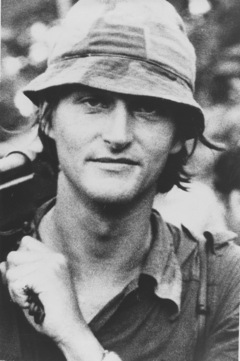Jon Swain - writer and foreign correspondent
“[A] splendid memoir... a tale, at once tragic and beautiful, of love and loss, of coming of age and of witnessing the end of Indochina as the West had known it for more than a century.” - LA Times
“An absolutely riveting book ... haunting, compulsive, and beautifully written, River of Time looks set to become a classic.” - Alexander Frater, Observer
“A romantic, evocative and touching book, the story of a young man’s coming-of-age in the shocking but desperately alluring war zones of Cambodia and Vietnam.” - Sunday Telegraph
Jon in Vietnam, 1972
Jon’s memoir includes a description of his arrival in Phnom Penh.
“I explored the friendly little city - a perfect fusion of French and Asian cultures - feeling I had arrived in a world of new dimensions where all my dreams could come true. All the accumulated restraints of western life could be abandoned in the primitive simplicity and beauty of Indo-China. I’d had a reasonable amount of luck - loving parents, a good education in Britain - but I was determined to make my way as a foreign correspondent without the string-pulling that marked many such careers. Here I would be able to say my goodbyes to the gaucheries of my youthful self and be free for the first time in my life.
I arrived with a young man’s conceptions about the glory of war and believing firmly in the chivalrous ideal. I had read widely; I had grown up on Buchan, Conrad, Forester, Henty, Wren, but also on books about World War Two and France’s own wars in Indo-China. The need to confront a life-threatening situation was strong. I itched to know, albeit with trepidation, how I would react on the borderland of death. Would I behave like a staunch Buchan hero or panic and run away?
I already had an Indian upbringing which gave me a feel for life in a colonial environment. Until 1953 I grew up in the first years of independent India, but my parents’ life was even then pure British colonial. I was much more seduced by the French version.”



